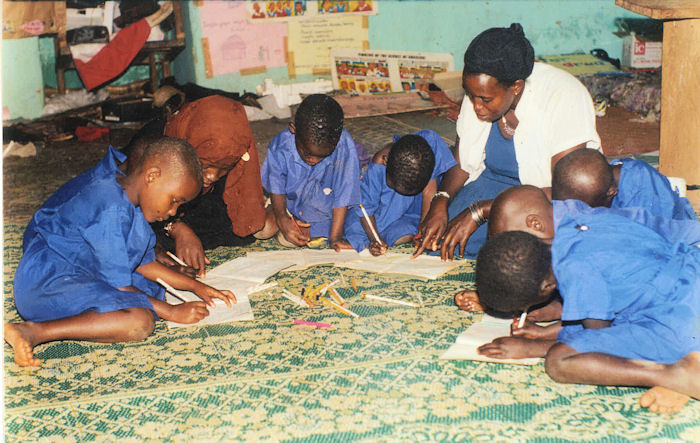
Madrasa school students concentrate as their teacher helps them to write sentences in English. Courtesy of Shamim Murji
The English novelist Thomas Hardy would perhaps have titled my journey to Uganda The Return of the Native – after all, I was returning to Kaliro, Uganda, where I was born 38 years ago. My visit was of a dual purpose: I planned to visit all the places of my childhood, including my home and my schools, but I also wanted to give something back to the country where I grew up, which gave me so many invaluable memories.
The opportunity I had been waiting for arrived when I heard of the need for volunteer teachers at the Aga Khan Foundation Madrasa Resource Centre (MRC) in Kampala. I convinced my friend and colleague, Ann Jeffs, with whom I teach in Brampton, Ontario, to embark upon the trip with me. We were convinced that it was going to be an incredible experience which would fulfil Ann's thirst to travel to Africa, and my longing to “return home.”
The Madrasa Pre-school Programme was launched by the AKF over 25 years ago in Kenya's coastal region to help parents in marginalised communities improve the overall level of educational achievement of their children. Studies revealed that the problem of access to education as well as later learning achievement could be linked back to the early years, and AKF suggested that early childhood education might be the key.

Shamim Murji and Ann Jeffs meet Syda Bbumba, the Ugandan Minister of Finance, who was the chief guest at the 25th anniversary of the AKF Madrasa Programme. Courtesy of Shamim Murji
The Foundation worked with local educators, community leaders and parents to formulate a pilot project to set up the first madrasa preschools. The Programme subsequently became hugely successful and expanded into Tanzania and Uganda. The MRC is really the catalyst for implementation of the Early Childhood Education Programme. It is staffed with skilled preschool teacher trainers, community mobilisers, and mentoring and research officers from the region.
Kampala's Madrasa Resource Centre is located in a beautiful building that was previously the Mengo Jamatkhana. It is enclosed within a large courtyard comprising exquisite tropical gardens with jacaranda, magnolia and hibiscus trees in full bloom. The Project Manager, Shafique Sekalala, and his team of Early Childhood Education facilitators were able to chart out a plan for us to visit approximately 15 schools in small village communities around Kampala. These were originally traditional Qur'anic schools, where AKF harmoniously blended in an early childhood education component that prepared the children to meet the competitive primary schools' entrance requirements.
Each morning at around 8:00 AM, Bahdur, one of the MRC's staff, drove us to the schools. His incredible driving skills helped us manoeuvre through Kampala's most horrendous traffic jams and even worse potholes. We were fortunate to visit and work with teachers and students at so many schools.
The Madrasa Programme has several components that make this preschool programme unique: children learn through exploring, experimenting, discovering patterns and building positive relationships – with each other, with the teachers and within their communities. It also requires teachers to create a supportive learning environment rich with local materials such as beads, seeds, shells, maize cobs, bottle tops, sticks and stones. The materials are easily readily available and interesting to the children, while also serving as effective learning tools.
The teaching pedagogy in a Madrasa school can be compared with a preschool classroom in Canada. Having taught kindergarten in the Peel Board of Education in Ontario, I had fun immersing myself with the children at the various learning areas set up in each of the schools: a block area, book area, sand and water area, and shop and home areas.
There were usually three teachers who planned and taught together. These were motivated and enthusiastic women selected by their communities to train as Early Childhood Development teachers. Their training would later enable them to gain employment as teachers elsewhere, mainly in government schools where they would take their acquired Madrasa pedagogy with them.

Madrasa Programme teachers gather to prepare learning materials for their students and classrooms. Courtesy of Shamim Murji
There wasn't a day that I was not moved by these women who genuinely demonstrated care, compassion and courage. The teachers worked long hours in often arduous conditions and were paid little or no salary. Their commitment stemmed from a desire to contribute towards the betterment of their communities by educating their children. I felt drawn to them professionally and emotionally. We became kindred spirits as we learned together to develop and strengthen our skills for teaching reading and numeracy strategies to young children.
Ann and I were in awe of all the women who showed up in their large numbers from afar to attend our workshops. Their passion, open-mindedness and zeal to be the best they can were truly inspiring and I feel privileged to have worked with these exemplary women.
AKF's Madrasa Pre-school Programme is creating a magnificent legacy. Having witnessed its positive outcome on marginalised communities, I can confidently vouch for its success. The primary teachers from whom I inquired about the progress of the Madrasa students confirmed unanimously that they made a better transition than their peers and continue to perform well. This valiant project is making an extraordinary impact on the lives of Ugandan women and children, placing their destinies in their own hands.








